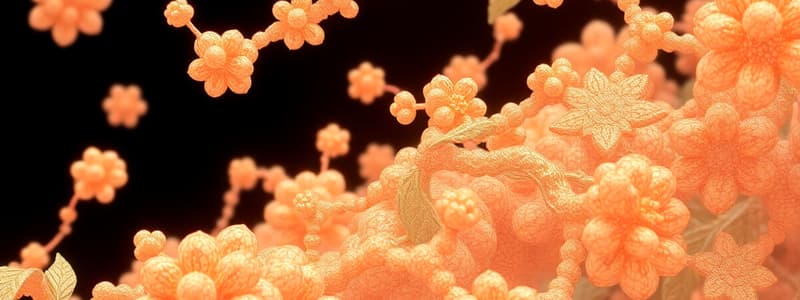Podcast
Questions and Answers
What is the correct structural composition of a phospholipid?
What is the correct structural composition of a phospholipid?
- 3 fatty acids + 1 phosphate group
- 1 fatty acid + 2 phosphate groups
- 1 fatty acid + 1 phosphate group
- 2 fatty acids + 1 phosphate group (correct)
Which part of a phospholipid is hydrophilic?
Which part of a phospholipid is hydrophilic?
- Fatty acid tails
- Phosphate group (correct)
- Bilayer structure
- Cell membrane
What is one of the primary functions of proteins in the body?
What is one of the primary functions of proteins in the body?
- Filter toxins
- Provide insulation
- Serve as enzymes (correct)
- Store energy
What type of molecule is composed of amino acids linked by peptide bonds?
What type of molecule is composed of amino acids linked by peptide bonds?
What is the main function of nucleic acids?
What is the main function of nucleic acids?
What distinguishes the structure of proteins from other macromolecules?
What distinguishes the structure of proteins from other macromolecules?
Which of the following elements is NOT commonly found in proteins?
Which of the following elements is NOT commonly found in proteins?
What is the energy yield of proteins when consumed?
What is the energy yield of proteins when consumed?
What are the basic sub-units that make up macromolecules called?
What are the basic sub-units that make up macromolecules called?
Which process involves breaking down polymers into monomers by adding water?
Which process involves breaking down polymers into monomers by adding water?
What is the main function of carbohydrates?
What is the main function of carbohydrates?
Which of the following is considered a polymer of carbohydrates?
Which of the following is considered a polymer of carbohydrates?
Which macromolecule is primarily associated with long-term energy storage?
Which macromolecule is primarily associated with long-term energy storage?
What is the energy storage capacity of carbohydrates?
What is the energy storage capacity of carbohydrates?
What are the monomers that make up lipids called?
What are the monomers that make up lipids called?
Which type of macromolecule is primarily involved in cell membrane structure?
Which type of macromolecule is primarily involved in cell membrane structure?
Flashcards are hidden until you start studying
Study Notes
Macromolecules
- Large molecules found in all living things
- Made up of carbon and are responsible for biological function
Polymer Structure
- Monomers: Small subunit molecules
- Polymers: Large, complex structures made of monomers
Polymer Formation and Breakdown
- Dehydration reaction: Forms polymers by linking monomers together, removing a water molecule
- Hydrolysis: Breaks down polymers into monomers, adding a water molecule to break bonds
Carbohydrates
- Function: Short-term energy storage, structural support, transport, signaling
- Found in sugars and starches
- Composed of carbon, hydrogen, and oxygen
- Monomer: Monosaccharides (single sugar molecules)
- Example: Glucose (main fuel for cells)
- Polymer: Polysaccharides (large sugar molecules)
- Example: Starch (how plants store sugar)
- Energy storage: 4 calories per gram
Lipids
- Function: Long-term energy storage, insulation, protection, structure
- Found in fats, oils, phospholipids, steroids
- Composed of carbon, hydrogen, and oxygen
- Monomer: Fatty acids
- Polymer: Triglycerides
- Energy storage: 9 calories per gram
Phospholipids
- Special type of lipid
- Structure: Two fatty acids and one phosphate group
- Hydrophilic (water-loving) head: Phosphate group
- Hydrophobic (water-hating) tail: Fatty acids
- Phospholipid bilayer: Two layers make up the cell membrane
- Selectively permeable membrane
Proteins
- Function: Diverse functions including:
- Enzyme control
- Hormone regulation
- Structural support
- Transport
- Immune system defense
- Movement
- Cell signaling
- Energy source
- Found in meats, nuts, dairy products, and produced by the body
- Composed of carbon, hydrogen, oxygen, nitrogen, and sulfur
- Monomer: Amino acids
- Polymer: Polypeptide (amino acids linked by peptide bonds)
- Energy storage: 4 calories per gram
Protein Structure
- Four levels of structure:
- Primary Structure: Amino acid sequence
- Secondary Structure: Local folding patterns (alpha helix, beta sheet)
- Tertiary Structure: Three-dimensional shape of a single polypeptide chain
- Quaternary Structure: Arrangement of multiple polypeptide chains
- Structure dictates function
Nucleic Acids
- Function: Information molecules that store, transmit, and express genetic information; contain instructions for protein synthesis
- Found in DNA and RNA
- Composed of carbon, hydrogen, oxygen, nitrogen, and phosphorus
- Obtained from parents, not food
Studying That Suits You
Use AI to generate personalized quizzes and flashcards to suit your learning preferences.




